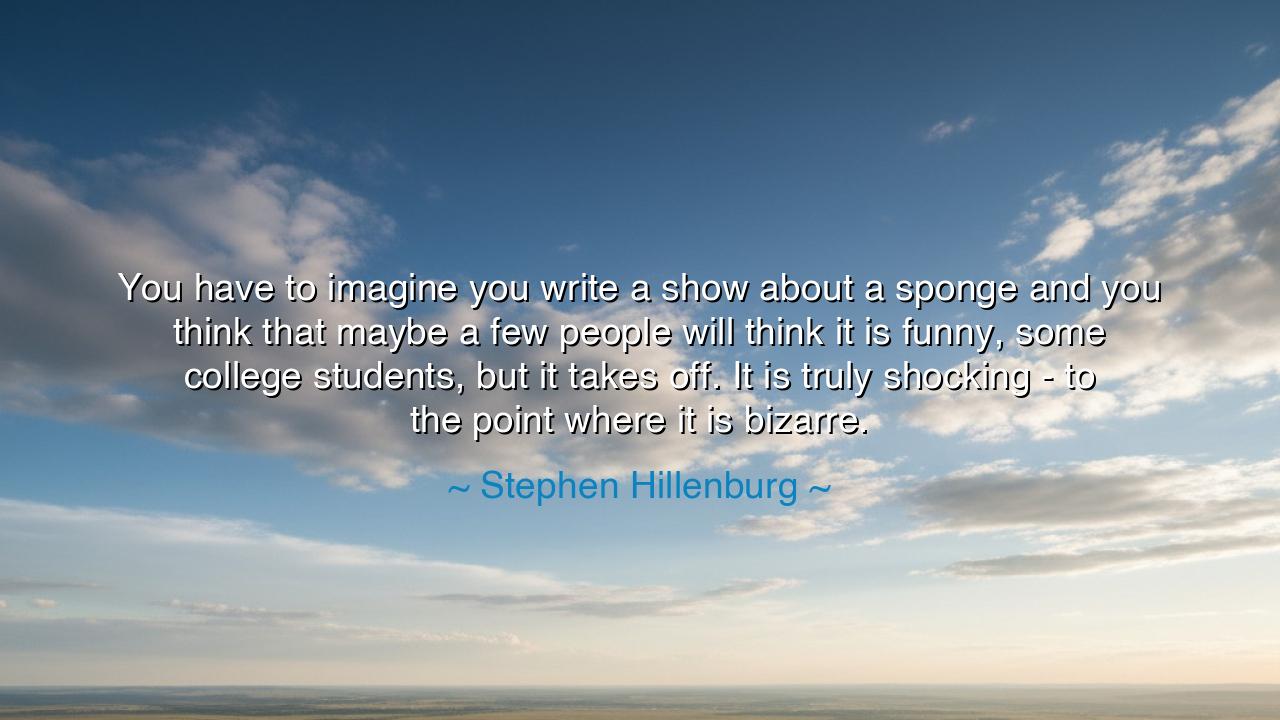
You have to imagine you write a show about a sponge and you think
You have to imagine you write a show about a sponge and you think that maybe a few people will think it is funny, some college students, but it takes off. It is truly shocking - to the point where it is bizarre.






When Stephen Hillenburg said, “You have to imagine you write a show about a sponge and you think that maybe a few people will think it is funny, some college students, but it takes off. It is truly shocking — to the point where it is bizarre,” he was not merely describing the unexpected success of SpongeBob SquarePants — he was speaking to the mystery of creation, the humility of artistry, and the wondrous unpredictability of how the world receives what the heart dares to make. His words carry the ancient truth that no one, not even the creator, can foresee the destiny of their creation. It is the artist’s task to build with sincerity, not expectation; to give birth to something absurd and joyful, and let the winds of the world decide its fate.
The origin of this reflection lies in Hillenburg’s journey — a marine biologist turned animator, a man who blended the precision of science with the freedom of imagination. He conceived a cartoon about a talking sponge, a creature of the sea endowed with laughter and innocence, never expecting that such a strange and simple vision would ripple across generations. In his words, “it takes off,” we hear both awe and bewilderment — for success that grows beyond comprehension can feel less like achievement and more like witnessing a miracle. The artist sets a small sail, and somehow it catches a divine wind.
The ancients understood this phenomenon well. The Greek poet Homer, if he truly existed, could never have imagined that his verses — sung by wandering storytellers — would echo through millennia. Likewise, Leonardo da Vinci, sketching his flying machines, could not have foreseen that centuries later, humans would actually soar through the heavens he only dreamed of. Great creation is often born of modest intent. The bizarre becomes the eternal, and what begins as whimsy may one day become wisdom. Hillenburg’s astonishment mirrors this timeless lesson: that greatness often wears the mask of absurdity when it first enters the world.
In Hillenburg’s words, there is also humility — the awareness that no one controls the impact of their own art. The artist may plant a seed, but it is the soil of the collective heart that determines how it grows. When SpongeBob was born, it was meant as a playful exploration of joy and innocence — a celebration of absurd humor and childlike curiosity. But what Hillenburg could not predict was how deeply the world longed for such innocence. In a time of cynicism and complexity, a sponge who believed in friendship, laughter, and jellyfishing became a beacon of light. The creator’s small offering became a cultural tide, carried far beyond his intention.
This truth is echoed in the lives of many creators. Consider Mary Shelley, who wrote Frankenstein as a ghost story among friends, never imagining it would birth an entire genre. Or J.R.R. Tolkien, who began The Hobbit as a tale for his children, only to awaken an epic mythology that would outlive him. Hillenburg’s “bizarre” success belongs to this lineage — proof that art grows larger than the artist, that the world often sees beauty where its maker saw only curiosity. The creator’s task is not to predict the outcome, but to be faithful to the impulse that gave it life.
There is a deep wisdom here for all who dream. We live in an age obsessed with control — with results, metrics, and validation — yet Hillenburg’s astonishment reminds us that the truest art emerges when expectation is surrendered. To create something sincere, even if absurd, is an act of faith. The artist must release their work into the world like a bottle into the sea, never knowing where the current will take it. The mystery of reception is beyond calculation; the miracle of resonance is not ours to command.
So, my listener, let this be your lesson: Do not fear the ridiculous, for the ridiculous is often divine. What seems strange or small in your hands may become vast in the hearts of others. Do not create for fame, for fame is fickle; create because something inside you insists on being born. Make your “sponge” — your peculiar idea, your unlikely vision — and let it breathe. For history remembers not the careful imitators, but the dreamers who dared to be bizarre.
And if ever the world embraces your creation in ways you cannot comprehend, meet that moment not with pride, but with wonder. For as Hillenburg knew, every true artist is both the builder and the witness — the one who shapes the dream, and then stands amazed as it takes on a life of its own. To create is to surrender; to be surprised is to be blessed. And sometimes, the greatest miracles begin with nothing more than a sponge and a little laughter beneath the sea.






AAdministratorAdministrator
Welcome, honored guests. Please leave a comment, we will respond soon